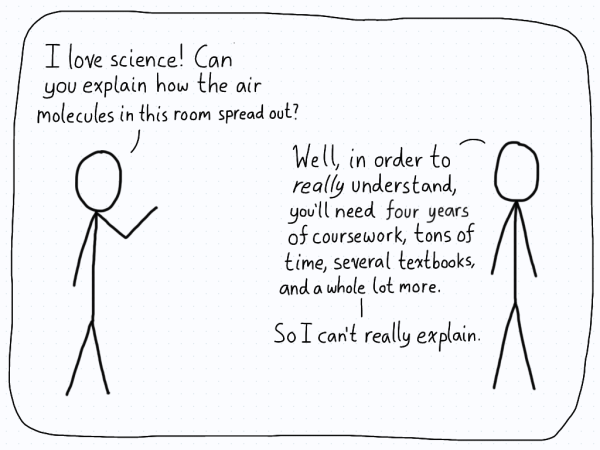The Necessary Details
As a student in science, you’re taught how to understand the details, the gory bits of an argument or a concept. When you learn about Kepler’s law of equal areas being swept out in equal times, you’re not just told that fact, but you prove it. Each part of the argument is explained, and you get a full explanation.
This is great, but the problem is that we don’t get to learn how to explain a concept. We’re given all of the details, but the truth is that they aren’t all useful when explaining the idea to someone else. The other person probably doesn’t care about the technical details. They want the big picture, so focusing on the minutiae doesn’t help them. The result is that they become disinterested.
The details are important, but it depends on the situation. If you’re trying to learn a subject, then sure, look at all of the technical details. However, if you want an overview of an idea, getting into the details isn’t as important.
Achieving this balance is crucial when trying to communicate an idea. What are your goals? Do you want the person to have enough knowledge to explain the concept themselves, or do you want them to understand the idea? You also need to consider what they are looking for. Without aligning these two objectives, attempts to explain science won’t go well.
I’ve noticed this difficulty when trying to describe my work to my family. They have no background in physics, so my explanations can’t be technical. I therefore have to find other ways to explain what I do. Do they understand the details when I’m done explaining? Of course not, but that’s not my goal. My goal is to get them to the point where they could summarize what I do in a few sentences instead of blankly saying, “He studies something in science.”
As I’ve gone through my undergraduate degree, I’ve realized that this is something which isn’t emphasized nearly enough. Perhaps it’s the result of my specific program or the university I attend, but there’s not a lot of emphasis on outreach and explaining what it is we do to a broader audience. Maybe that’s because it doesn’t seem like an “important” part of the job of a scientist, but I wholeheartedly disagree with that sentiment. On a practical level, scientists are mostly funded by government agencies or academic institutions, which means this is public money. As such, I would argue we have an obligation as scientists to explain what we are doing to the public.
On a more philosophical level, I think it’s important to do this because science affects all of our lives. We learn about how the world around us works, and we get to be curious about our place in the universe. Explaining science is a worthy endeavour, and yet science students aren’t prepared to do this. Instead, they focus on working through problem sets.
It all begins with choosing which details are necessary. Of course, we could just say, “If you’re interested in science, look at a textbook!” This might help in terms of disseminating information, but it doesn’t take into account the amount of knowledge the average person has. A standard textbook will likely be too advanced for them, and it’s not designed to inform. It’s designed to give all the details, which is more than a person often wants.

If you’re a science student, my wish is that you take the time to explain what you’re learning to others. In particular, try to explain your research or what you’re learning to those who have little experience in science. By doing this, you will get to practice the art of giving just the right amount of detail. You get the benefit of getting more people to learn about science, and I think you will find that your own knowledge of the subject will become more stable. After all, one of the best ways to internalize a concept is to explain it to others.
Just because we aren’t taught this in university, it doesn’t mean it’s worthless. It might be one of the more important things we do.